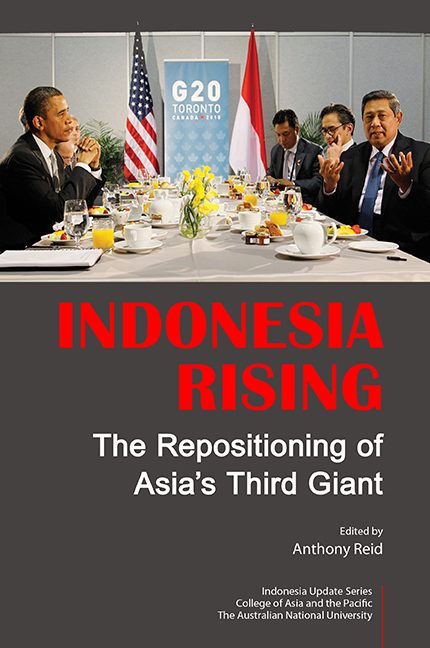Book contents
- Frontmatter
- Contents
- Tables
- Figures
- Contributors
- Foreword by Gareth Evans
- Preface
- Glossary
- 1 Indonesia's New Prominence in the World
- 2 Indonesia in the New World Balance
- 3 Indonesia's Role in the World Economy: Sitting on the Fence
- 4 Is Indonesia Rising? It Depends
- 5 Domestic Politics and International Posture: Constraints and Possibilities
- 6 Can Indonesia Lead on Climate Change?
- 7 Indonesian Muslims and Their Place in the Larger World of Islam
- 8 Indonesia's Quiet Springtime: Knowledge, Policy and Reform
- 9 Problems of Identity and Legitimacy for Indonesia's Place in the World
- Index
- INDONESIA UPDATE SERIES
Preface
Published online by Cambridge University Press: 21 October 2015
- Frontmatter
- Contents
- Tables
- Figures
- Contributors
- Foreword by Gareth Evans
- Preface
- Glossary
- 1 Indonesia's New Prominence in the World
- 2 Indonesia in the New World Balance
- 3 Indonesia's Role in the World Economy: Sitting on the Fence
- 4 Is Indonesia Rising? It Depends
- 5 Domestic Politics and International Posture: Constraints and Possibilities
- 6 Can Indonesia Lead on Climate Change?
- 7 Indonesian Muslims and Their Place in the Larger World of Islam
- 8 Indonesia's Quiet Springtime: Knowledge, Policy and Reform
- 9 Problems of Identity and Legitimacy for Indonesia's Place in the World
- Index
- INDONESIA UPDATE SERIES
Summary
This book is the latest to appear in a long and distinguished lineage. The Australian National University's Indonesia Update began in 1983, when the late Jamie Mackie and Peter McCawley conceived and implemented the idea of an annual public conference in Canberra to assess conditions in Indonesia. From the beginning it was understood as an alliance between economic and political analysts, with numerous other disciplines playing appropriate roles. As the format congealed the conference was held annually on a weekend in late September, and began with two surveys of the past year – one economic and the other political. The remaining papers were clustered around a theme of particular topical importance.
With Hal Hill playing a lead role through the ANU's Indonesia Project, which he headed for many years, the Update books have been published regularly since 1989. They now constitute a kind of record of an evolving nation. The two survey papers were initially published in the Update books, but since 2005 they have been published quickly in the Bulletin of Indonesian Economic Studies, while the papers clustered around the theme of each year's conference became the basis of a substantial book published in the following year. This book is the 23rd publication in the Indonesia Update series, and it emanates from the 29th conference. Greg Fealy (politics) and Chris Manning and Raden Purnagunawan (economics) provided the two overviews, which were published in the Bulletin of Indonesian Economic Studies of November 2011.
The theme of the Update, held on 30 September and 1 October 2011, was ‘Indonesia's place in the world’. After a series of volumes naturally focusing on Indonesia's difficult transition to a democratic and decentralized format, it was felt to be time to look at the country's international stance and standing. Admission to the G20 group of nations was one factor making this timely; the pressures of globalization on every country were another. The concept of ‘Indonesia's rise’ emerged at Don Emmerson's suggestion in the planning process as the title for one panel of the conference, very much in quotes. One paper after another, however, grappled in some way with the international perception that this might at last be Indonesia's moment, unlikely as it seemed to oft-disappointed specialists. The book has therefore cohered around this issue.
- Type
- Chapter
- Information
- Indonesia RisingThe Repositioning of Asia's Third Giant, pp. xix - xxPublisher: ISEAS–Yusof Ishak InstitutePrint publication year: 2012

